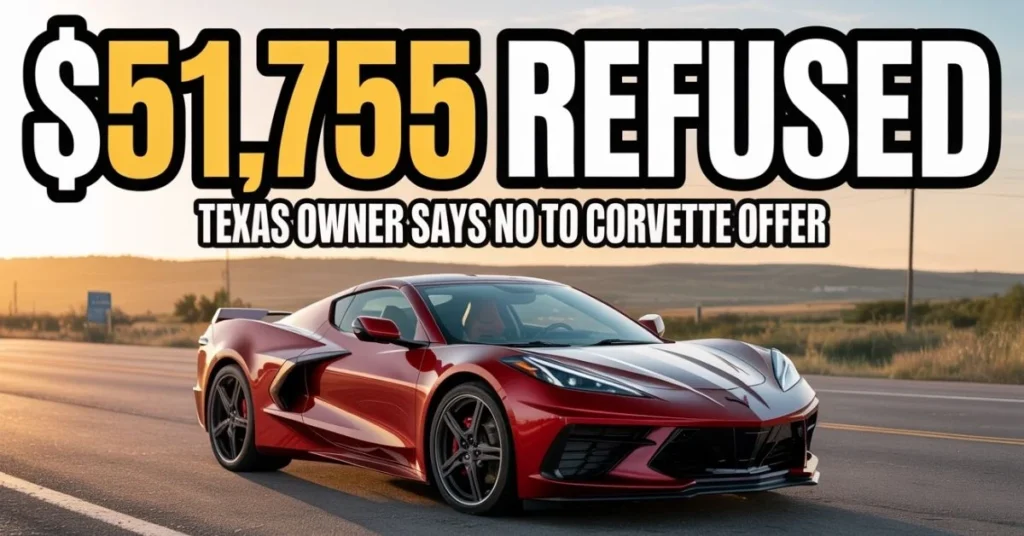Introduction
The automotive world is no stranger to passionate owners who value their vehicles beyond mere market price. Recently, a Texas man made headlines when he refused to sell his 2022 Chevrolet Corvette Stingray Z51, despite receiving a substantial offer of $51,755. This decision has sparked intense debate among automotive enthusiasts and industry experts alike, raising important questions about vehicle valuation, depreciation, and the emotional attachment that comes with owning a high-performance sports car. For those who frequent establishments like Corvette Warehouse or Corvette Warehouse of Dallas, this story resonates deeply, as it highlights the complex factors that influence buying and selling decisions in the modern automotive market.
The refusal to sell this particular Corvette offers valuable insights into the current state of the C8 Corvette market, the impact of mileage and damage history on resale value, and the broader implications for sports car ownership. Just as enthusiasts carefully research used engines and used transmissions for their restoration projects, understanding the true value of performance vehicles requires comprehensive knowledge of specifications, condition factors, and market dynamics.
The Vehicle in Question: A Closer Look at the 2022 Corvette Stingray Z51
Performance Specifications and Features
The Texas man refuses to sell Corvette story centers around a 2022 Chevrolet Corvette Stingray Z51 Performance model—a vehicle that represents the pinnacle of American sports car engineering. This isn’t just any base Corvette; the Z51 package transforms the already impressive Stingray into a track-ready machine with substantial performance upgrades.
Key Performance Features:
- Engine: 6.2-liter LT2 V8 producing 495 horsepower and 470 lb-ft of torque (similar in displacement to the legendary 6.2 LS engine found in various GM performance vehicles)
- Transmission: 8-speed dual-clutch automatic transmission—a far cry from traditional automatic transmissions like the 6L80 transmission found in earlier Corvette generations
- Acceleration: 0-60 mph in approximately 2.9 seconds
- Top Speed: Around 194 mph
- Z51 Upgrades: Enhanced braking system, firmer suspension tuning, performance exhaust, improved cooling systems, electronic limited-slip differential, and track-optimized rear axle
The vehicle also boasts premium features including a removable roof panel, LED headlights, a Bose premium sound system, and an onboard performance data and video recorder—tools that serious driving enthusiasts value highly.
Visual Appeal and Exterior Design
Finished in Red Mist Metallic with an Adrenaline Red interior, this Corvette presents a striking appearance that commands attention. The color combination represents one of the more distinctive options available for the C8 generation, adding to the vehicle’s special character and potential collector appeal. Much like how classic muscle cars with period-correct Chevrolet Camaro engines command premium prices, unique color combinations can significantly impact resale values.
The Condition Factor: Understanding What Affects Value
Mileage Considerations
One of the most significant factors in this case is the high mileage accumulated on the vehicle. With approximately 30,200 miles (48,600 km) on the odometer, this Corvette Warehouse of Dallas would likely classify as a higher-mileage example. The vehicle has been driven substantially more than typical examples of its age. Registered in Houston, Texas, the Corvette clearly served as more than a weekend toy—it was driven regularly and enjoyed as intended.
Accident History and Repairs
In April 2023, the Corvette was involved in a minor collision that resulted in front fascia damage requiring towing and approximately $10,000 in repairs. Importantly, the airbags did not deploy during this incident, suggesting the impact was relatively minor. Despite this accident, the vehicle maintains a clean Texas title, which is crucial for resale value.
This scenario mirrors what many buyers face when purchasing vehicles with replaced components. Just as savvy buyers seek quality Ford Mustang engines or Dodge Charger engines for repairs, the quality of accident repairs significantly impacts vehicle value.
Cosmetic Issues
Beyond the accident repairs, the vehicle shows typical signs of real-world use:
- Paint chips on various exterior panels
- Curb rash on the wheels
- Wear on the roof latch mechanism
- Interior liner deterioration
While these issues are common on heavily-driven vehicles, they do impact the overall condition rating and, consequently, the market value. Understanding these factors is as important as knowing the specifications when researching performance vehicles or replacement components like Chevy Silverado 1500 engines.
The Offer: Breaking Down the $51,755 Proposition
Original Purchase Price vs. Current Offer
The first owner of this Corvette paid approximately $80,660 when purchasing the vehicle new. The offer of $51,755 represents a depreciation of roughly $28,905, or about 36% of the original purchase price. This depreciation rate, while significant, must be evaluated in context with the vehicle’s condition, mileage, and market conditions.
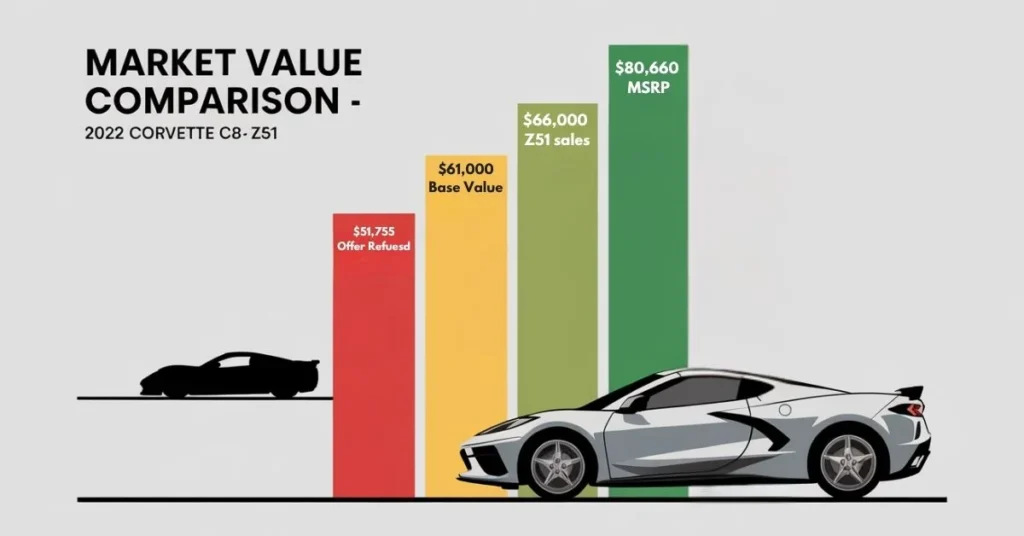
Market Value Comparison Table
| Vehicle Category | Year | Mileage | Condition | Reported Value/Range |
| Subject Corvette (Z51) | 2022 | 30,200 miles | Minor accident, cosmetic issues | Offered $51,755 |
| Base Stingray Coupe (KBB) | 2022 | Average | Good condition | ~$61,000 |
| High-Mileage Example | 2021 | 43,000 miles | Clean history | Sold for ~$66,000 |
| Z51 Performance Package | 2022 | Low miles | Excellent | $68,000-$75,000 |
| New Z51 Stingray MSRP | 2022 | 0 miles | New condition | $80,000+ |
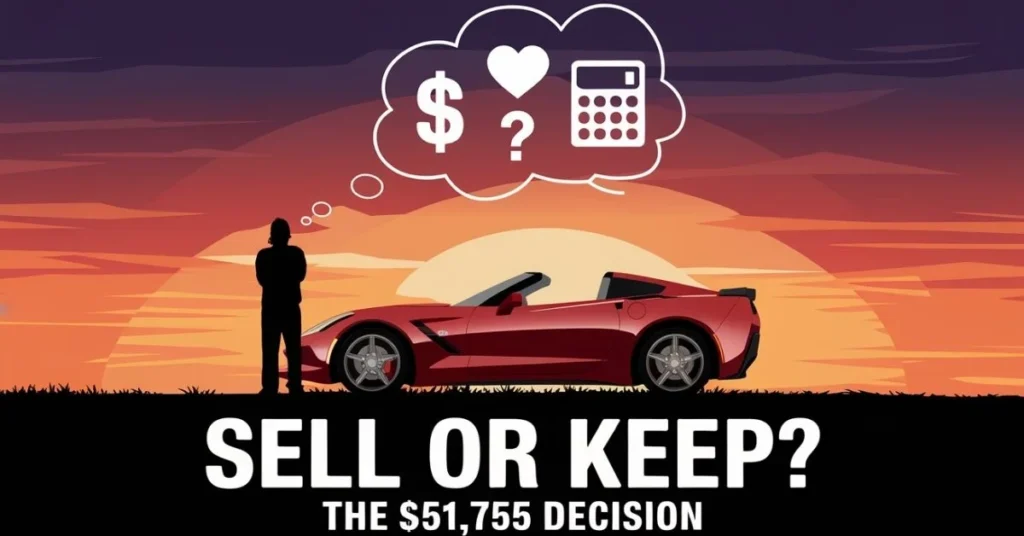
Why the Texas Man Refused to Sell His Corvette
Performance Value Retention
The owner’s refusal to sell his Corvette likely stems from several rational considerations. The Z51 Performance package adds substantial value beyond the base model, with upgrades that cost thousands of dollars when ordered new. These performance enhancements don’t depreciate at the same rate as standard features, as they appeal to a specific enthusiast market willing to pay premium prices.
This principle applies across the performance vehicle spectrum—whether discussing the legendary 5.3 LS engine in trucks, the robust 6.0 LS engine in performance applications, or the iconic Hellcat engine in modern muscle cars. Performance specifications maintain value because they deliver tangible capabilities.
Market Analysis and Comparable Sales
Looking at market data from sources like Kelley Blue Book and recent sales reports, a 2022 Corvette Stingray coupe in base trim configuration fetches around $61,000 in the used market. Given that this vehicle has the Z51 package and desirable color combination, the owner’s belief that it’s worth more than $51,755 appears justified, even accounting for the higher mileage and accident history.
Factors Supporting the Owner’s Decision:
- Z51 Performance package adds $6,000-$10,000 in value
- Rare and desirable Red Mist Metallic/Adrenaline Red color combination
- Clean title despite accident history
- Comparable Z51 models selling for $60,000-$66,000
- Strong demand for C8 Corvettes in the enthusiast market
- Professional repairs documented with clean title retention
The Corvette Warehouse Perspective
For those familiar with specialty retailers like Corvette Warehouse or Corvette Warehouse of Dallas, the pricing dynamics of performance Corvettes are well understood. These establishments recognize that well-equipped models with desirable options command premium prices, even with higher mileage, because the buyer demographic values performance capabilities and specifications over odometer readings.
This specialized knowledge mirrors the expertise required when sourcing quality replacement powertrains. Whether customers need a Ford F-150 engine for their work truck or a Dodge Viper engine for an exotic build, understanding true market value versus wholesale offers is crucial.
Depreciation Patterns in High-Performance Vehicles
Understanding C8 Corvette Market Dynamics
The C8 generation Corvette represents a revolutionary shift for Chevrolet’s iconic sports car, moving to a mid-engine layout for the first time in the model’s history. This fundamental change has created unique market dynamics similar to how the introduction of advanced transmissions like the 10L90 transmission revolutionized GM’s automatic gearbox offerings.
Factors Affecting C8 Values:
- Limited initial production created strong demand
- Mid-engine exotic car performance at accessible prices
- Strong brand loyalty among Corvette enthusiasts
- Performance that rivals six-figure European exotics
- Relatively stable resale values compared to previous generations
- Technological advancements attracting new demographic of buyers
High-Mileage Impact on Exotic Cars
While 30,200 miles may seem moderate for a typical sedan or pickup truck requiring a Ford F-250 engine replacement, it’s considered high for a performance sports car of this caliber and age. However, the impact on value must be balanced against the vehicle’s capabilities and the fact that many buyers specifically seek well-sorted examples that have been properly driven and maintained.
Consider this: A well-maintained high-mileage Corvette with documented service history can be more desirable than a garage-queen with mechanical issues from sitting unused. This principle applies whether you’re evaluating a complete vehicle or considering replacement components like a Toyota Camry engine or Honda Accord transmission—usage history and maintenance matter more than raw numbers.
The Broader Implications for Sports Car Ownership
Investment vs. Enjoyment
This case highlights a fundamental tension in sports car ownership: should these vehicles be preserved as investments or enjoyed as intended? The Texas owner clearly chose to drive and enjoy his Corvette, accumulating miles that reflect genuine use. This decision, while impacting resale value, represents the authentic sports car ownership experience.
Similar debates occur throughout the automotive community. Enthusiasts building project cars with components like Ford Mustang Coyote engines or 2JZ engines for sale must balance performance goals with budget constraints and future resale considerations.
Making Informed Buying and Selling Decisions
For prospective buyers and sellers in the performance car market, this story offers several key lessons:
For Sellers:
- Research comparable sales thoroughly before accepting offers
- Understand your vehicle’s true market value, not just wholesale offers
- Factor in rare options and performance packages (Z51, Carbon Fiber packages, etc.)
- Consider multiple selling avenues (private sale, specialty dealers, auctions)
- Clean title status is crucial, even with accident history
- Documentation of repairs and maintenance adds substantial value
- Professional appraisals can provide leverage in negotiations
For Buyers:
- High-mileage performance cars can offer value if properly maintained
- Minor accident history with clean title shouldn’t automatically disqualify a vehicle
- Performance packages (Z51, handling packages) significantly impact long-term value
- Specialty dealers like Corvette Warehouse of Dallas often provide better-vetted inventory
- Consider total cost of ownership, including potential repairs requiring Chevrolet Camaro engines or other major components
- Verify all service records and accident documentation
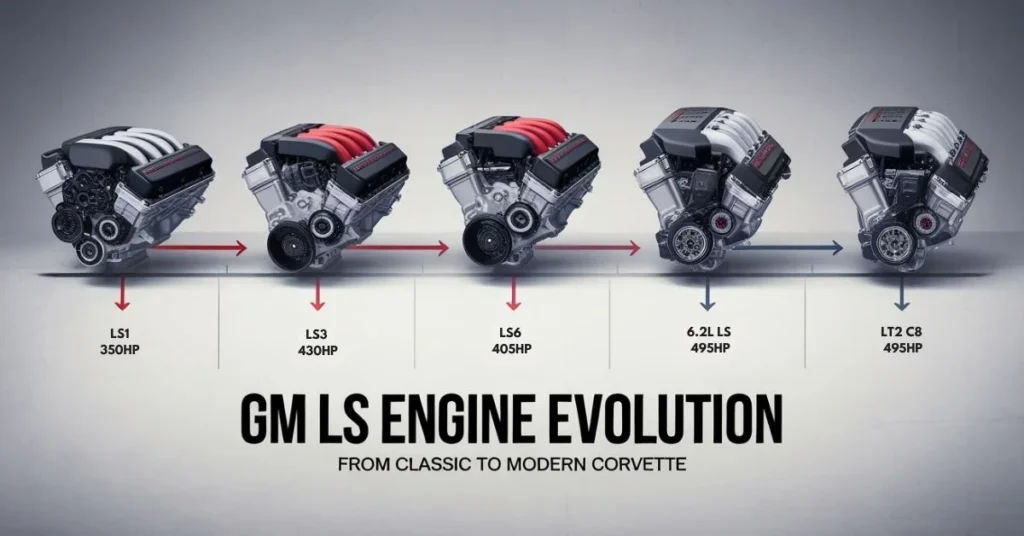
Understanding Performance Powertrain Value
The LS Engine Legacy and Corvette Heritage
The Corvette’s LT2 engine belongs to the legendary GM small-block family that has powered everything from vintage muscle cars to modern performance trucks. Understanding this heritage helps contextualize the value proposition. Enthusiasts seeking the proven 5.3 Vortec engine or legendary LS6 motor recognize that GM’s engineering expertise translates directly to resale value retention.
Transmission Technology and Performance
The C8 Corvette’s advanced 8-speed dual-clutch transmission represents cutting-edge technology that contributes significantly to the vehicle’s performance credentials. This is worlds apart from earlier automatic transmissions like the 4L60E transmission or even the improved 4L80E transmission found in previous-generation Corvettes.
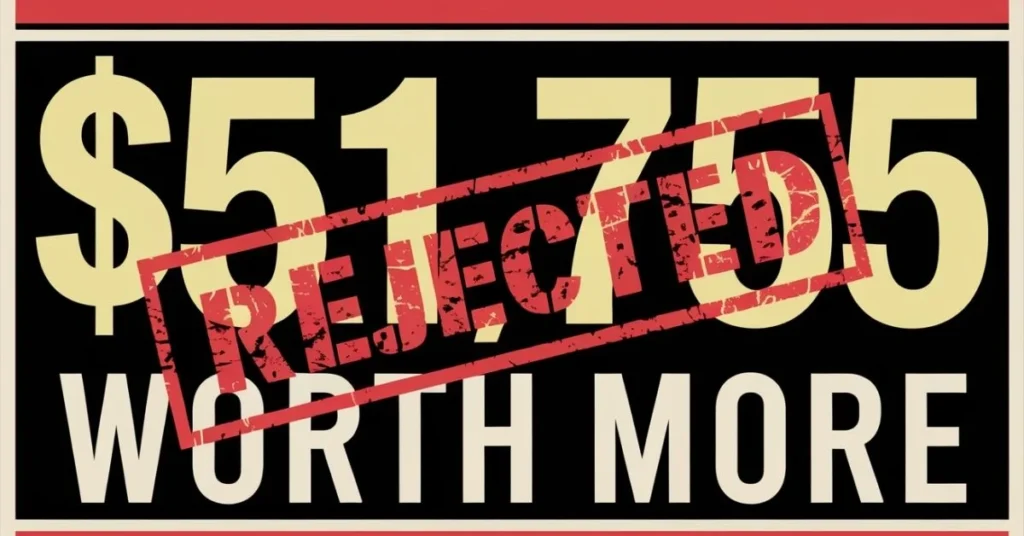
Expert Opinion: Was Refusing the Offer the Right Move?
Financial Analysis: The Numbers Tell the Story
From a purely financial standpoint, the owner’s refusal appears justified. Let’s break down the mathematics:
Value Components:
- Base 2022 Corvette Stingray market value: ~$61,000
- Z51 Performance Package premium: +$6,000 to $8,000
- Desirable color combination: +$1,000 to $2,000
- Subtotal: $68,000-$71,000
- High mileage adjustment: -$6,000 to $8,000
- Accident history with clean title: -$5,000 to $7,000
- Cosmetic issues: -$2,000 to $3,000
- Realistic market value: $54,000-$60,000
The offered price of $51,755 sits at the bottom of this realistic range, suggesting the owner could reasonably expect better offers by being patient or exploring alternative selling venues like specialty dealers or private sales.
Emotional Value Considerations
Beyond dollars and cents, the owner may have attached emotional value to the vehicle, having accumulated over 30,000 miles of driving experiences. For many sports car enthusiasts, these memories and the connection to their vehicle justify holding out for a better offer or simply keeping the car longer.
This emotional attachment is common across the automotive spectrum—whether someone is restoring a classic with a period-correct Dodge Ram engine, building a performance truck with a Chevy Silverado transmission, or maintaining their beloved sports car.
Industry Expert Perspectives
Automotive industry professionals generally agree that the owner made a defensible decision. Key considerations include:
Market Timing: The used sports car market fluctuates seasonally. Spring and summer typically see higher prices as buyers prepare for driving season—similar to how demand for Jeep Wrangler engines peaks before summer off-road season.
Dealer vs. Private Sale: Wholesale offers from dealers typically range 15-25% below retail values to allow for reconditioning, overhead, and profit margin. Private sales or consignment through specialty dealers like Corvette Warehouse often yield significantly better results.
Comparable Sales Data: Multiple Z51 Corvettes with similar mileage have sold for $60,000-$66,000, validating the owner’s skepticism about the $51,755 offer.
The Broader Market Context: Performance Vehicle Values
American Performance Cars Hold Strong
The story of this Texas man refuses to sell Corvette incident reflects broader trends in American performance car values. Vehicles like the Corvette, Dodge Challenger, and Ford Mustang have demonstrated remarkable value retention compared to many competitors.
Parts Availability and Long-Term Ownership
One factor supporting Corvette values is excellent parts availability. Unlike exotic European sports cars requiring expensive proprietary components, Corvettes benefit from GM’s extensive parts network. Owners needing repairs have access to affordable options similar to those sourcing Ford Explorer engines or Toyota Tundra engines—reliable, available, and reasonably priced.
Real-World Implications for Vehicle Owners
When to Accept an Offer
Understanding when to accept or reject vehicle offers requires careful consideration:
Accept Lower Offers When:
- Immediate cash needs outweigh potential future gains
- The vehicle requires significant repairs (major Ford F-350 engine replacement, transmission failure)
- Market conditions are declining
- Extended selling time isn’t feasible
- Multiple appraisals confirm the offer is fair
Hold Out for Better Offers When:
- Comparable sales data supports higher valuations
- The vehicle has unique, desirable features
- Market conditions favor sellers
- No urgent financial need exists
- Alternative selling venues haven’t been explored
Maximizing Vehicle Value Before Sale
Owners looking to maximize resale value should consider:
Preparation Steps:
- Complete all deferred maintenance
- Address cosmetic issues cost-effectively
- Gather all service records and documentation
- Obtain pre-sale inspection reports
- Professional detailing and photography
- Consider timing (seasonal demand fluctuations)
These principles apply whether selling a performance Corvette or a work truck with a replacement Chevy Silverado 1500 engine—presentation and documentation significantly impact final sale prices.
Conclusion
The Texas man refuses to sell Corvette story represents more than a simple transaction—it reflects the complex interplay of market values, personal attachment, and understanding of true vehicle worth. Based on comprehensive market analysis and the specific attributes of this Z51 Performance model, the owner’s decision appears both financially sound and strategically wise.
Key Takeaways:
- Market Data Supports the Decision: Comparable Z51 Corvettes are selling for $60,000-$66,000, suggesting the $51,755 offer undervalued the vehicle by $8,000-$14,000.
- Performance Specifications Matter: The Z51 package, rare color combination, and premium features add substantial value that wholesale offers often don’t adequately reflect.
- Clean Title is Crucial: Despite accident history, maintaining a clean title preserved significant resale value.
- Alternative Selling Venues Exist: Specialty dealers like Corvette Warehouse or Corvette Warehouse of Dallas, private sales, and online auction platforms often yield better results than traditional dealer trade-ins.
- Patience Can Pay: Holding out for the right buyer who appreciates the vehicle’s specific attributes typically results in better outcomes.
For automotive enthusiasts and prospective buyers visiting specialty retailers or researching components like used engines and used transmissions for their projects, this case study provides valuable insights into performance vehicle valuation. It demonstrates that options, packages, and specifications matter significantly—sometimes more than mileage or minor cosmetic issues.
Whether you’re considering selling your performance vehicle, buying a high-mileage sports car, or simply interested in automotive market dynamics, the fundamental lesson remains: informed decisions based on comprehensive research yield better outcomes than reactive choices driven by immediate circumstances.
Ready to Make Your Move? Whether you’re buying or selling a performance Corvette, sourcing quality replacement engines for your project car, or need expert transmission solutions, take time to research current market values thoroughly. Consult with specialty dealers like Corvette Warehouse of Dallas, review comparable sales data, and make decisions based on facts rather than pressure tactics. Your dream car—or fair price—may be just around the corner. For more automotive insights and expertise, explore our comprehensive guides on everything from GM LS engines to car maintenance essentials.
Frequently Asked Questions
-
What is the typical depreciation rate for a Corvette C8?
The C8 Corvette typically depreciates 20-30% in the first two to three years under normal circumstances. However, high mileage (over 20,000 miles) and accident history can accelerate this rate to 35-40%. Well-optioned models with performance packages like the Z51 tend to hold value better than base configurations, similar to how vehicles with premium powertrains like the BMW B58 engine or BMW N55 engine retain value better than base models.
-
How does the Z51 Performance package affect resale value?
The Z51 package typically adds $6,000-$8,000 to resale value compared to base models, as it includes significant mechanical upgrades that appeal to performance-oriented buyers. This premium is maintained even on higher-mileage examples because the actual performance capabilities remain unchanged. The value retention parallels how specialized components like Tremec transmissions or T56 transmissions command premiums in the enthusiast market.
-
Does accident history significantly impact Corvette values?
Minor accidents with proper repairs and clean titles typically reduce value by 10-15% compared to accident-free examples. However, if airbags deployed or structural damage occurred, the impact can be 20-30% or more. In this case, the minor nature of the accident (no airbag deployment, only fascia damage) and quality repairs minimize the negative effect. Clean title retention is crucial—salvage titles can reduce values by 40-50%.
-
Where can I find reliable pricing for performance Corvettes?
Resources include Kelley Blue Book, NADA Guides, recent auction results (Bring a Trailer, Cars & Bids), and specialty dealers like Corvette Warehouse of Dallas. Consulting multiple sources and examining actual sales data provides the most accurate picture. Online forums and enthusiast communities also offer real-world transaction insights. For broader automotive research, resources like our car maintenance checklist can help maintain vehicle value.
-
Is 30,000 miles considered high for a 2-year-old Corvette?
Yes, the average Corvette accumulates 3,000-5,000 miles per year, making 30,000 miles in roughly 2-3 years significantly higher than typical. However, this indicates the car was driven and enjoyed rather than stored, which some buyers prefer as it suggests proper operation and maintenance. Regular use prevents issues common in garage-stored vehicles, similar to why mechanics often recommend driving vehicles with Honda Civic engines or Toyota Corolla engines regularly to maintain optimal condition.
-
Should I buy from a specialty Corvette dealer like Corvette Warehouse?
Specialty dealers offer several advantages: thorough pre-purchase inspections, detailed vehicle histories, reconditioning to address cosmetic issues, warranty options, and expertise in performance vehicles. While prices may be 5-10% higher than private sales, the reduced risk and convenience often justify the premium. These dealers understand performance specifications and can accurately assess vehicles with specialized components, much like specialist shops that work exclusively with performance engines like the Nissan RB26 engine.

